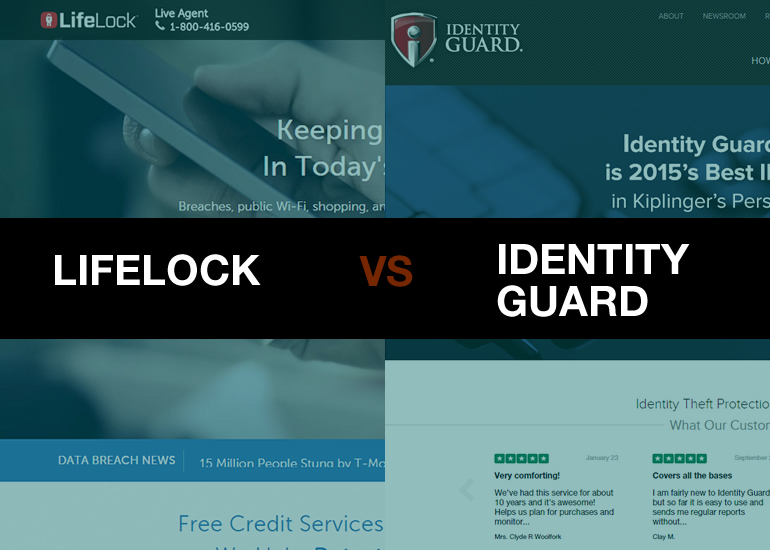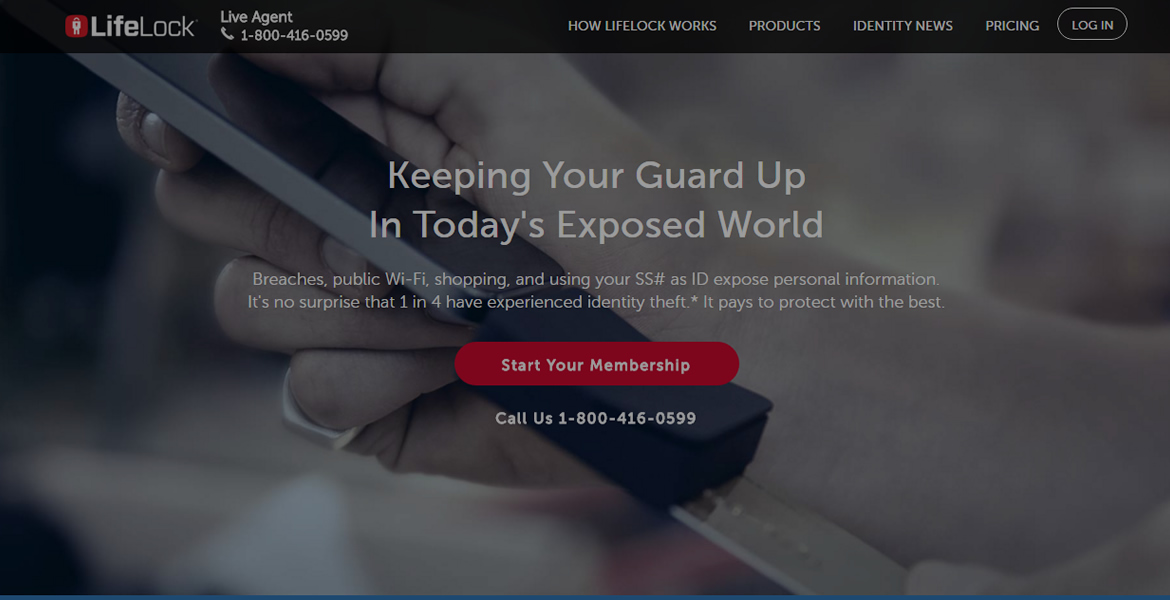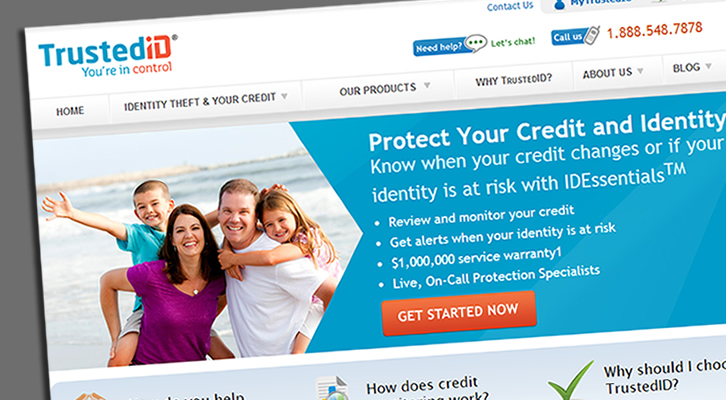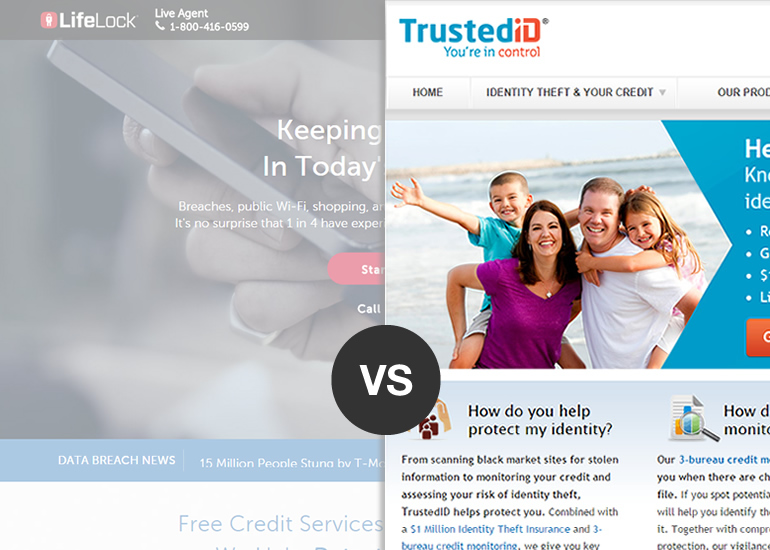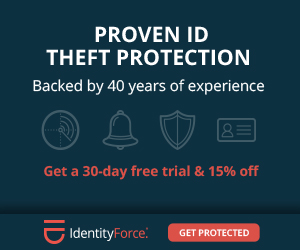Will The Best Identity Theft Service Please Stand Up?
This is a comparison between the flagship services of Lifelock and Identity Guard: Lifelock’s Ultimate Plus and Identity Guard’s Platinum.
One reason we won the cold war is we simply outspent the Soviet Union. It was nearly impossible for an economy based on centralized planning to keep up with a capitalist economy. Things like tanks, ships, and fighter jets are notoriously expensive to buy and maintain and the Soviet Union literally bankrupt themselves trying to keep up. (The real nail on the coffin was Reagan’s Star Wars Initiative.)
Identity Guard and especially Lifelock have taken the United States playbook and must be outspending their competition at some obscene ratio. Their advertisements are everywhere: on the web, television, print media, and on the radio. One of the likely reasons you’ve found this page is you’re considering an identity theft service and have heard about Lifelock or Identity Guard. That’s the power of branding.
Lifelock
In its early days Lifelock revolved their protection services around setting and renewing fraud alerts. Several lawsuits later, Lifelock has adopted a more detection focused approach much like Identity Guard’s Total Protection and Platinum.
Lifelock introduced Command Center in December 2009 amid much fanfare and it’s a much needed upgrade from their original service. This service eventually evolved into Lifelock Advantage and Lifelock Ultimate Plus. Lifelock will now scan public databases, court records, and even sex offender registry reports for your information.
With this new service Lifelock is essentially admitting that’s it’s near impossible to prevent identity theft and instead focuses on an early warning system to prevent the theft from getting beyond your control to resolve it.
Identity Guard
Identity Guard of course has been singing this tune all along. While Lifelock probably has more brand recognition, Identity Guard from Intersections Inc. has been successfully fighting identity theft for more than 18 years and for some of the biggest names in financial services.
So how do these two detection services compare?
[css3_grid id=’Table_t1_s1′]
If you’ve done any research you’ll realize most comparison charts can be manipulated to highlight or hide selected features.
Although we are licensed affiliates of both Lifelock and Identity Guard, we are sincere about providing our readers with objective and accurate information. There are several Lifelock features such as Data Breech reporting that we’ve omitted because we feel that while they may provide for great marketing copy, the utility to consumers is negligible.
We have chosen to highlight what we believe is the largest difference between the two largest identity protection competitors and illustrate the value of choosing Identity Guard over Lifelock.
The Importance of Monitoring Your Credit Score and Credit Report
If we can agree that it’s impossible to prevent identity theft then it’s not a large step to realize the value of frequent updates. While Lifelock Ultimate Plus checks your credit report and score, it only updates them once a year. Identity Guard updates them monthly. It’s a significant difference that can have an immense effect on the damage identity thieves can inflict.
While Lifelock makes a big deal about scanning public records, sex offender reports, and now data breaches, these may initially sound impressive but if you did a little bit deeper, the actually benefit to consumers is dubious.
For example, the new Data Breach notifications is simply letting you know about data breaches as they’re reported in the news. A feature anybody can simply duplicate by setting up a google alert.
It’s the same with Sex Offender Registry Reports. You receive reports when sex offenders move into your zip code. While helpful, it’s nothing you can’t accomplish be visiting free public sites and something that’s at best tangentially related to preventing or monitoring identity theft.
So Why Doesn’t Lifelock Offer Credit Monitoring?
While it’s true that identity theft occurs beyond your credit report, experts agree the best way to detect identity theft is through monitoring your credit report.
So why does Lifelock leave this important feature out? Only Lifelock knows but I’d hazard a guess it has something to with the costs involved. Identity Guard pays the three major credit reporting agencies (TransUnion, Equifax, Experian) for access to the credit reports. Somebody in Lifelock’s management decided to pursue detection technology outside your credit report.
It’s not hard to understand the strategic thinking behind this decision. This way Lifelock isn’t beholden to the credit reporting agencies it has a somewhat fractious relationship with and can offer consumers services unique to Lifelock instead of a clone of more traditional protection services.
But by not offering credit monitoring services is Lifelock shortchanging their customers? I think so.
Will an identity thief will be better detected by monitoring court records and sex offender registry reports or by the daily monitoring of all three credit reports? There’s a strong financial incentive for identity thieves to profit and if that’s the case, your credit report is where they’re going to be doing the most damage.
*I was contacted by Identity Guard to correct some inaccurate information. Identity guard DOES monitor payday loan activity and sex offender registry reports through ID Analytics. In addition, public records and court records are also scanned within the Public record Monitoring feature. Looks like some of Lifelock Ultimate Plus’s unique features aren’t so unique after all.
Opinion
Lifelock built its entire protection service around placing and renewing fraud alerts. Lifelock was doing this when nobody else was and if imitation is the sincerest form of flattery, then Lifelock should be flattered.
There are numerous companies that imitate what Lifelock does. They were also the first to offer a million dollar guarantee which everybody also copied. Throw in a CEO who publicly announces his social security number in the press and dares identity thieves to steal it, and it’s no wonder Lifelock is the market leader. Lifelock has brilliant marketing and it resonates with consumers. But while all this may sound lovely at a shareholder meeting, is it truly effective? Is it better than credit monitoring?
If it’s Lifelock or nothing, by all means choose Lifelock. Get some measure of protection for your identity. But if its a choice between monitoring everything outside your credit report and monitoring your credit report, I choose credit monitoring.
There is simply no way to guarantee the security of your personal information. Monitoring your credit file daily for any changes is the best way to protect your identity, your property, and your life.

